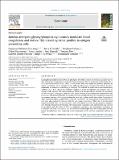Files in this item
Babesia divergens glycosylphosphatidylinositols modulate blood coagulation and induce Th2-biased cytokine profiles in antigen presenting cells
Item metadata
| dc.contributor.author | Debierre-Grockiego, Françoise | |
| dc.contributor.author | Smith, Terry K. | |
| dc.contributor.author | Delbecq, Stéphane | |
| dc.contributor.author | Ducournau, Céline | |
| dc.contributor.author | Lantier, Louis | |
| dc.contributor.author | Schmidt, Jörg | |
| dc.contributor.author | Brès, Virginie | |
| dc.contributor.author | Dimier-Poisson, Isabelle | |
| dc.contributor.author | Schwarz, Ralph T. | |
| dc.contributor.author | Cornillot, Emmanuel | |
| dc.date.accessioned | 2019-10-31T16:30:12Z | |
| dc.date.available | 2019-10-31T16:30:12Z | |
| dc.date.issued | 2019-12 | |
| dc.identifier | 262577344 | |
| dc.identifier | e0de7072-ebe8-44a5-8012-e7f7f65ad6c4 | |
| dc.identifier | 85072926229 | |
| dc.identifier | 000496992000013 | |
| dc.identifier.citation | Debierre-Grockiego , F , Smith , T K , Delbecq , S , Ducournau , C , Lantier , L , Schmidt , J , Brès , V , Dimier-Poisson , I , Schwarz , R T & Cornillot , E 2019 , ' Babesia divergens glycosylphosphatidylinositols modulate blood coagulation and induce Th2-biased cytokine profiles in antigen presenting cells ' , Biochimie , vol. 167 , pp. 135-144 . https://doi.org/10.1016/j.biochi.2019.09.007 | en |
| dc.identifier.issn | 0300-9084 | |
| dc.identifier.other | crossref: 10.1016/j.biochi.2019.09.007 | |
| dc.identifier.uri | https://hdl.handle.net/10023/18813 | |
| dc.description | This work was supported by the the University of Tours (to IDP and FDG), the University of Montpellier (to SD and EC), the Deutsche Forschungsgemeinschaft (to RTS), the Wellcome Trust project grant 093228 (to TKS) and the Campus France/DAAD PHC PROCOPE 24931RE (to RTS and EC). The funding source has no involvement in the conduct of the research and preparation of the article. | en |
| dc.description.abstract | Glycosylphosphatidylinositols (GPIs) are glycolipids described as toxins of protozoan parasites due to their inflammatory properties in mammalian hosts characterized by the production of interleukin (IL)-1, IL-12 and tumor necrosis factor (TNF)-α. In the present work, we studied the cytokines produced by antigen presenting cells in response to ten different GPI species extracted from Babesia divergens, responsible for babesiosis. Interestingly, B. divergens GPIs induced the production of anti-inflammatory cytokines (IL-2, IL-5) and of the regulatory cytokine IL-10 by macrophages and dendritic cells. In contrast to all protozoan GPIs studied until now, GPIs from B. divergens did not stimulate the production of TNF-α and IL-12, leading to a unique Th1/Th2 profile. Analysis of the carbohydrate composition of the B. divergens GPIs indicated that the di-mannose structure was different from the evolutionary conserved tri-mannose structure, which might explain the particular cytokine profile they induce. Expression of major histocompatibility complex (MHC) molecules on dendritic cells and apoptosis of mouse peritoneal cells were also analysed. B. divergens GPIs did not change expression of MHC class I, but decreased expression of MHC class II at the cell surface, while GPIs slightly increased the percentages of apoptotic cells. During pathogenesis of babesiosis, the inflammation-coagulation auto-amplification loop can lead to thrombosis and the effect of GPIs on coagulation parameters was investigated. Incubation of B. divergens GPIs with rat plasma ex vivo led to increase of fibrinogen levels and to prolonged activated partial thromboplastin time, suggesting a direct modulation of the extrinsic coagulation pathway by GPIs. | |
| dc.format.extent | 10 | |
| dc.format.extent | 1441965 | |
| dc.language.iso | eng | |
| dc.relation.ispartof | Biochimie | en |
| dc.subject | Antigen presentation | en |
| dc.subject | Coagulation | en |
| dc.subject | Glycosylphosphatidylinositol | en |
| dc.subject | Interleukin | en |
| dc.subject | Major histocompatibility complex | en |
| dc.subject | QD Chemistry | en |
| dc.subject | QH301 Biology | en |
| dc.subject | RC0254 Neoplasms. Tumors. Oncology (including Cancer) | en |
| dc.subject | NDAS | en |
| dc.subject | SDG 3 - Good Health and Well-being | en |
| dc.subject.lcc | QD | en |
| dc.subject.lcc | QH301 | en |
| dc.subject.lcc | RC0254 | en |
| dc.title | Babesia divergens glycosylphosphatidylinositols modulate blood coagulation and induce Th2-biased cytokine profiles in antigen presenting cells | en |
| dc.type | Journal article | en |
| dc.contributor.sponsor | The Wellcome Trust | en |
| dc.contributor.institution | University of St Andrews. School of Biology | en |
| dc.contributor.institution | University of St Andrews. Biomedical Sciences Research Complex | en |
| dc.identifier.doi | 10.1016/j.biochi.2019.09.007 | |
| dc.description.status | Peer reviewed | en |
| dc.identifier.grantnumber | 093228/Z/10/Z | en |
This item appears in the following Collection(s)
Items in the St Andrews Research Repository are protected by copyright, with all rights reserved, unless otherwise indicated.

